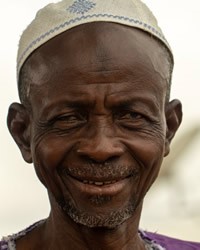The Hausa are the largest ethnic group in West Africa. Thirty percent of all Hausa can be found in the north and northwest regions of Nigeria, an area known as "Hausaland." Hausa communities can also be found in other West African nations such as Chad, Ghana, the Ivory Coast, Togo, and Benin.
The Hausa in Benin have been there as far back as 1897. Oral history tells us that the earliest Hausa settlers in Benin came with the Europeans when Benin was conquered. These Hausa people helped the Europeans hunt elephants.
Some have wrongly assumed that Boko Haram comes from the Hausa because the term itself is from the Hausa language. But Boko Haram is mainly from Kanuri and Fulani as well as other tribes.
The Hausa are the largest ethnic group in West Africa. Thirty percent of all Hausa can be found in the north and northwest regions of Nigeria, an area known as "Hausaland." Hausa communities can also be found in other West African nations such as Chad, Ghana, the Ivory Coast, Togo, and Benin.
The Hausa in Benin have been there as far back as 1897. Oral history tells us that the earliest Hausa settlers in Benin came with the Europeans when Benin was conquered. These Hausa people helped the Europeans hunt elephants.
The Hausa in West Africa have been heavily involved in long distance trading for centuries. Traders exchanged gold from the Middle East for leather, crafts, and food.
There is inter-marriage between the Hausa community and the peoples of Benin. Marriages between the two communities are very common. Today members of the Hausa community are highly trained, educated, and assimilated into the political and social life in Benin. Some of the Hausas have become very rich. They are deeply involved in the politics of their communities.
The Hausa people have a restricted dress code related to their Muslim religious beliefs. The men are easily recognizable because of their elaborate dress which is a large flowing gown known as Babban riga and a robe called a jalabia. These large flowing gowns usually feature some elaborate embroidery designs around the neck. The women can be identified by wrappers called zani, made with colorful cloth atampa, accompanied by a matching blouse, head tie, and shawl.
Hausa buildings are characterized by the use of dry mud bricks in cubic structures, multi-storied buildings for the social elite, the use of parapets related to their military/fortress building past, and traditional white stucco and plaster for house fronts. At times the facades may be decorated with various abstract relief designs, sometimes painted in vivid colors to convey information about the occupant.
Today members of the Hausa community are highly trained, educated and assimilated into the political and social life of many African countries including the Democratic Republic of the Congo (DRC). Some of the Hausas have become very rich. They are deeply involved in the politics of their communities.
The Hausas hold firmly to their Islamic religion and values. The first mosque in Benin is the central mosque. This is where all early Muslim settlers worshiped. Later the Hausa community built their own mosque. The mosque is still there and was built about 50 years ago. That is where the Hausa Muslim community goes to pray on Fridays.
Adequate Christian resources are available in the Hausa language; but they are still an unreached Muslim people group. The Hausa people need to see their critical need for the Savior, who loves them and desires a personal relationship with them. They need to see past their worldly success, and see that they will not be accepted by the Creator of the universe except through His Son, Jesus
Pray that the Holy Spirit will allow circumstances into the lives of these people that will point to their sinfulness, their need for the Savior.
Pray that they will see that their Islamic religion is not working.
Scripture Prayers for the Hausa in Benin.
Profiles written by Karen Hightower of Global Prayer Digest
https://joshuaproject.net/people_groups/12070/NI
http://www.dailytrust.com.ng/sunday/index.php/feature/2875-the-100-year-old-story-of-hausa-community-in-benin-city
https://en.wikipedia.org/wiki/Hausa_people
http://www.nairaland.com/842223/mosque-burnt-hausa-quarters-benin
http://www.peoplegroups.org/explore/groupdetails.aspx?peid=12327
| Profile Source: Keith Carey |











